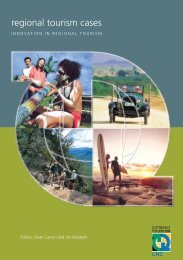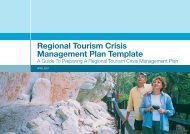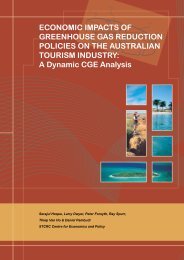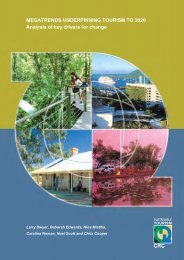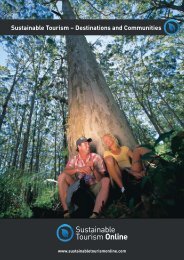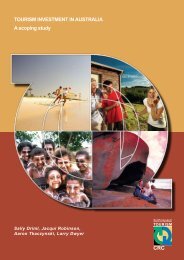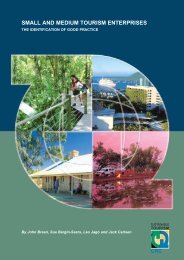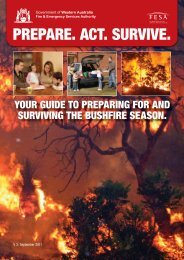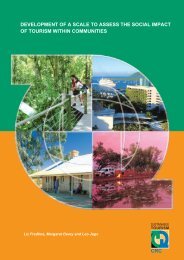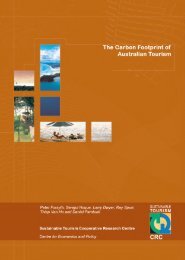Tourism Risk Management - Sustainable Tourism Online
Tourism Risk Management - Sustainable Tourism Online
Tourism Risk Management - Sustainable Tourism Online
Create successful ePaper yourself
Turn your PDF publications into a flip-book with our unique Google optimized e-Paper software.
on all relevant information, to recommend that Americans avoid travel to a certain country. The<br />
Australian Government’s Department of Foreign Affairs and Trade listed warnings against travel to<br />
six countries on the same date, and also recommended that travellers reconsider their need to travel<br />
to a further 14 countries.<br />
The US State Department also lists Public Announcements which are a means to disseminate<br />
information about terrorist threats and other relatively short-term and/or trans-national conditions<br />
posing significant risks to the security of American travellers. These are made any time there is a<br />
perceived threat and usually have Americans as the particular target group. In the past, Public<br />
Announcements have been issued to deal with short-term coups, bomb threats to airlines, violence<br />
by terrorists, and anniversary dates of specific terrorist events.<br />
While in a slightly different format, Australia’s DFAT issues essentially the same information as the<br />
US State Department, though it is interesting to note that at any one time some destinations may<br />
appear on one warning list but not another.<br />
Philippine Rebel<br />
Philippine terrorism has disturbed the country for at least three decades and has been carried out<br />
by different parties with different agendas. Some are the work of individuals and armed gangs to<br />
extort money and settle disputes, others are carried out by extremist groups. These include the<br />
communist New People’s Army, Abu Sayyaf and splinter groups from the Muslim separatist<br />
organizations, some are believed to have links with international terrorist groups including Jemaah<br />
Islamiah (Foreign & Commonwealth Office, 2003).<br />
Travel Advisories<br />
Due to the continuous threat of kidnappings, bombings and other violent incidents, many countries,<br />
including Korea, Canada, New Zealand, the UK and the US, have advised their citizens to avoid<br />
travelling to the southern Philippines where insurgent groups are active. Australia, the European<br />
Union and Canada have even closed their embassies in Manila temporarily because of terrorist<br />
threats.<br />
<strong>Tourism</strong> Statistics<br />
During three years of political unrest, international visitor arrivals have declined steadily in the<br />
Philippines. In 2000, total visitor arrivals were 1.99 million, a drop of 8.2% compared with 2.17<br />
million in 1999. In 2001, the number of visitors dropped further to 1.80 million which was 9.8% fewer<br />
than 2000. In terms of international tourism receipts, they have plummeted by 15.7% and 19.3%<br />
(2001) (Travel Industry Pub, 2002). The decline was due to a downturn in visits from the biggest<br />
markets, the US and Japan. Kidnappings and worries about air security after September 11 were<br />
the main causes.<br />
Although a decline continued in the first four months of 2002 (except February which had a modest<br />
3.7% rise), the situation was much improved in the remaining year despite travel advisories from<br />
several nations. Arrivals in May, June and July grew more than 10% year-on-year. August and<br />
September arrivals were up 5.7% and 15.2% respectively (Anonymous, 2002a). More visitors<br />
visited the Philippines in October despite a series of bomb attacks. Visitor arrivals posted a 36.7%<br />
growth compared to October 2001 (Anonymous, 2002b). The positive growth during these six<br />
months was the first in four years.<br />
Hotel Industry<br />
A week after the first mass kidnapping in April 2000, tour agents and hotels started receiving<br />
cancellations. The same happened after the Mindanao crisis. Although security was stepped up at<br />
<strong>Tourism</strong> <strong>Risk</strong> <strong>Management</strong> – An Authoritative Guide to Managing Crises in <strong>Tourism</strong> 83



